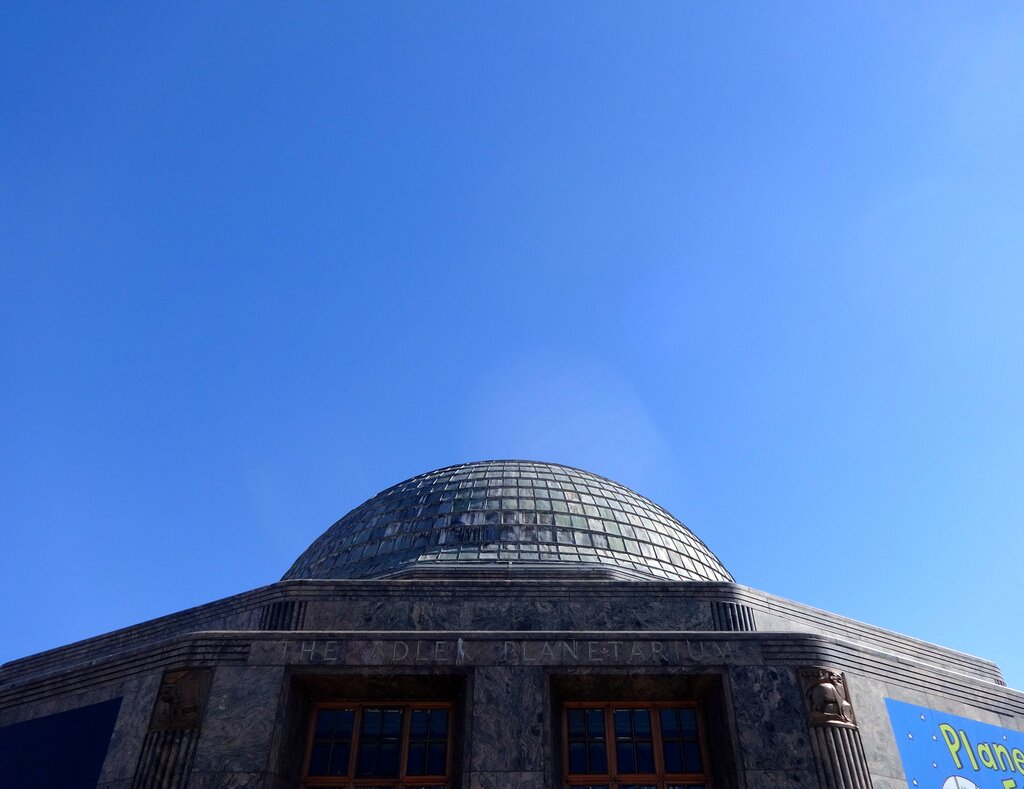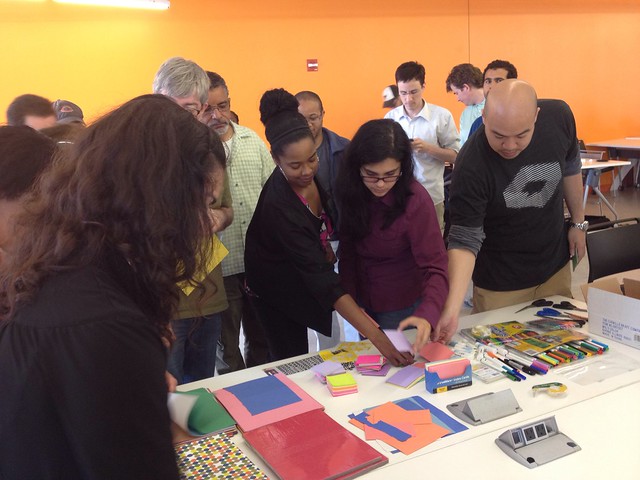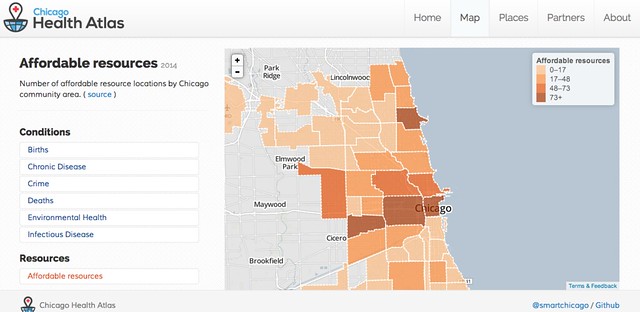Code for America and the Smart Chicago Collaborative are pleased to announce that the Midwest has been selected for the first Code for America Regional Brigade Program. The Midwest Regional Brigade program will support existing Code for America brigade cities as well as work to expand the number of brigade cities in the region. The program will be led by Smart Chicago consultant and current Chicago Brigade Captain Christopher Whitaker and will be headquartered at the Smart Chicago Collaborative.
Author: admin
Join us at the next OpenGov Chicago Meetup – For Science!
The next OpenGov Chicago next meetup will focus on Open Science. The Open Science Cooperative is an extension of the Hive Mapping Cooperative, a 2014 Hive Learning Network project.
We will have representatives from The Peggy Notebaert Nature Museum, Sweet Water Foundation, Freedom Games, and the Forest Preserve District of Cook County to talk about their efforts to provide teens the ability to collect, manage, analyze, visualize, and share geo-referenced data through open-source mapping and data-sharing software.
The aim of this meetup is to share work to date and to connect with the larger open data/ open technology community. This is an ambitious project focused on open source tools for mapping and data collection. The OpenGov movement has much to share on these fronts, and we hope for great cross-pollination on this night!
More about our speakers below. As always we’ll have food and we’ll be live streaming (and live tweeting) the event!
Getting at the Root of Issues with Juvenile Records
Here at Smart Chicago, we are interested in technology that helps improves the lives of regular Chicago residents. Expunge.io, a simple tool for kicking off the expungement process by by Cathy Deng and the Mikva Challenge Juvenile Justice Council, is a good example of that.
We’re also interested in helping bring along smart policies that mitigate the need for tech-based workarounds like Expunge.io. Illinois Senate Bill 0978 is a good example of that. Here’s the relevant portion of that legislation:
the Department of State Police shall automatically expunge, on or before January 1 of each year, a person’s law enforcement records relating to incidents occurring before his or her 18th birthday in the Department’s possession or control which pertain to the person when arrested as a minor if: (1) the minor was arrested for an eligible offense and no petition for delinquency was filed with the clerk of the circuit court; (2) the person attained the age of 18 years during the last calendar year; and (3) since the date of the minor’s most recent arrest, at least 6 months have elapsed without an additional arrest, filing of a petition for delinquency whether related or not to a previous arrest, or filing of changes not initiated by arrest.
Again, this is a great step in changing the law around the complex process of expungement. But this article in the Illinois State Bar Journal, Juvenile Justice, Part I: Automatic expungement of juvenile records, hints at the more difficult data/ technology realities behind juvenile records management.
One young woman completed an Illinois Job Corps program and when she applied for her pharmacy technician license, the licensing agency learned that she had an “aggravated battery” on her record, said Carolyn Frazier, an attorney and clinical law professor with the Children and Family Justice Center at Northwestern University School of Law. The girl was involved in a fight with other girls at school and was never charged with a crime, yet in some database, her arrest was listed without any dispositional information. Similarly, young man working as a janitor at a Chicago public school was fired after one of his annual background checks showed two arrests. Neither resulted in delinquency petitions or a finding of guilt.
As Frazier put it, we’re in a “brave new world of data integration” where municipalities small and large are sharing information with one another, the state, and the federal government. State police used to send information to the FBI, but that practice ended three years ago.
And the root of the harm:
Like other juvenile justice advocates, Frazier would like to see a legislative commission established to get to the root of why and how confidential information involving minors is being released.
As long as juvenile records are obtained and trafficked by unethical data purveyors, the eventual expungement of that record can have limited value.
Think of it this way: if someone discovers a lie about you in a database on a Tuesday (like the woman with an “aggravated battery” on her record who was never charged with a crime) and that lie is copied to a new database, owned by an unscrupulous data merchant, and the lie is removed from that database on a Wednesday (a successful expungement), the lie from Tuesday still exists, and can still cause harm.
We’ve got to get at the root.
Kick-Off Remarks at the Adler Planetarium on the National Day of Civic Hacking
Here’s some thoughts I shared with the youth at Adler Planetarium this morning:
Hi everybody.
It’s great to see you here at one of the premier places for science in Chicago, the Adler Planeterium.
This morning, you are joining thousands of colleagues— and they are your colleagues— in more than 100 cities in the National Day of Civic Hacking.
The National Day of Civic Hacking joins technologists, entrepreneurs, developers and other people like you to improve our communities and the governments that serve them.
Let me ask you now— how many people consider themselves to be developers? How many want to be technologists or web developers when you grow up? How many just want to hang out on the Internet and do stuff? I’m with you.
This is the second annual event, and the Adler has played a unique and critical part from the get-go. They have deliberately included young people in this day.
I’m Dan O’Neil and I run the Smart Chicago Collaborative, a civic organization devoted to improving lives in Chicago through technology.
One of our core words— our founding principles that we endlessly abide by— is everybody.
It’s super-important because when you’re trying to make technology that serves people, and don’t include people, bad things happens. Things go off the rails.
It happens all the time.
So I’m really happy that the Adler has such great programs to include youth like you in technology and to teach you real skills. It is a missing link in the chain of everybody, and they’re doing a great job in filling it, and I’m proud to say that we work together with them at Smart Chicago to do that.
Every culture has their stories, their tropes, their narratives of self-identity. One of the great stories we tell ourselves here in the United States is that every young person can be anything they want when they grow up.
We sometimes have trouble delivering on that as a country. Class lines get hardened. Simple geographic markers in neighborhoods become impenetrable barriers to individual progress. Lack of meaningful opportunity leads to decades of piled-on trouble.
The Internet, and the technology industry, is one of the great pathways in the ideal that we hold dear. In the technology industry, you really can grow up to be anything you want.
And I want you to help me. Help the Adler Planetarium, and the Smart Chicago Collaborative, and the dozens of huge organizations that are a part of the National Day of Civic Hacking. Help build our little part of this world— the civic innovation sector of the technology industry.
The part where we try to make new apps that make living together better, that allow us to make our government more accountable and effective, the part where the goal is to improve lives.
Thanks for showing up today. Get to work.
Dan O’Neil and Lola Chen on Big Data at PechaKucha Night with the Chicago Architecture Foundation
Tonight I co-presented at the Chicago: City of Big Data Pecha Kucha with my colleague and friend Lola Chen.
Here’s the presentation, along with complete text below.
I’m Dan O’Neil, and I run the Smart Chicago Collaborative, a civic organization devoted to improving lives in Chicago through technology. I’m here with Lola Chen, a community advocate here in Chicago. We are going to talk about the role of humans in big data in an urban environment.2.
I think it has a great role to play in helping understand how to run a city. The understanding of facts is critical to a just society. And what makes sense for other segments of our culture and economy can make sense for government.
3.
And much of my career has been devoted to data. I’ve made data-driven web products for the last decade. Smart Chicago Collaborative is a national leader in the creation of civic apps. We were the impetus behind bringing Open 311 to Chicago. I guess the point is, I know of what I speak.
4.
In my work at Smart Chicago, I’ve come to deeply appreciate the value of humans. They make all data. Data is a subset of humanity, not the other way around. I’ve seen first-hand what happens when the fetish of data can make everything go wrong.
5.
So I am dubious of any discipline that seeks to help people that doesn’t seem to really include people in meaningful ways. Remember how stoked Burgess Meredith was in the Twilight Zone when all the people were gone and he was left with his books?
6.
Pretty much every time I see something in the world of “big data” or “predictive analytics”, there is never any mention of humans. As if the machines are autochthonous, indigenous, comes from nowhere and knows everything. Empty of humans.
7.
But of course humans have made everything. And they are the most versatile and capable objects on earth. Burgess Meredith got pretty bummed when he immediately broke his glasses and couldn’t read any of his glorious books. His myriad word repositories were of no use. If only there was one other human left to read to him.
8.
I’ve come to know Lola through the OpenGovChicago meetup and she’s helped me greatly in my work at Smart Chicago. She is an amazing Chicago resident. She values data and technology, and is one of the best humans I know.
9.
Lola Chen is the master of the email. As I was preparing for this event, and I was pondering the value of humans in big data, she wrote me one of her missives. In it, she wrote, “Any alert person can ride the streets of Chicago and see the pattern of pothole problems. The ride might take 4 hours or so. The making notes might take 1 hour.” This is what I mean. This is the value of humans. So I yield the remainder of my Pecha Kucha to the great Lola Chen.
10.
Hi there, my name is Lola Chen, a self-confessed extreme data hog. I moved to Lincoln Park in 1969, right around when the federal government declared the area the first urban renewal blight zone. I first bought properties in Bucktown in 1984. I moved to East Garfield Park in 1998. All throughout, I collect data.
11.
Everywhere I go I ask the question “when might data be flawed”. I interviewed all sorts of residents and visitors from all over the world. All have seen Chicago Potholes. Data can be incomplete, biased, omitted, inaccurate, misclassified, or falsified. I have seen all of these.
12.
Here’s a practical example of the lack of data sharing. I had parked far from the curb due to a deep pothole. They gave me a ticket for being more than 13 inches from the curb. One piece of data that should relate to another. I GOT OUT OF THE TICKET.
13.
Data can be falsified faster than you think. I monitored grass cutting in vacant lots owned by the City. The workers knew they had GPS installed on the tractors, and they went up and down the lot, showing through through data that the lot was cut. But they lifted the blade so that no grass was cut. The lot was marked as done. It was not.
14.
Here we have a KINZIE INDUSTRIAL CORRIDOR series of long potholes going down the street that are DEEP. Chicago is currently promoting a return to manufacturing with hopes of creating new jobs. THAT IS WHY THESE POTHOLES ARE RELEVANT. There are patterns, visible, if you look.
15.
This lovely Lincoln Park ALLEY Pothole has a mural as a backdrop. Stanley’s is a neighborhood fruit market institution opened by Greek immigrants in the 1960s who have succeeded in expanding almost every decade. DON’T REALLY THINK AN ALGORITHM COULD PREDICT POTHOLE/MURAL
16.
This Humbolt Park CATCH BASIN Pothole seems to be accessorized with roadwork paraphernalia. Today the paraphernalia runs for almost 1 block it has been there so long. The paraphernalia becomes permanent. COULD AN ALGORITHM SPEED UP ROAD REPAIR?
17.
This sewer pothole was misclassified as fixed. It was not, however, fixed. This is shoddy workmanship that leads to multiple visits to the same issue, leading to more work for contractors and more dollars out of our pockets. The data saw “fixed”, but it was nothing of the sort.
18.
Here you can see the impetus of my note to Dan. Any alert person can see the issue with the seam in the asphalt. I’ve seen it all over, and reported it to a number of commissioners. The Inspector General is now looking into this.
19.
The City collects and stores enormous amounts of data, but the data is flawed, and there’s not enough. We need drones, satellites, patrol cars, garbage trucks, all collecting data and making 311 requests. There are no mechanisms to address these flaws. We need more people— smart City workers who know the data— cleaning this up. Let’s do it.
20.
So thank you to all the people who helped me put this together. If anybody in the world knows how to fox potholes, please send us some ideas!
Complete Data Set of Medicare Payments to Doctors and Suppliers in Chicago
 On April 9, 2014, the U.S. Centers for Medicare and Medicaid Services released data on the amount and type of billing that individual doctors and institutions submitted to the Medicare program in 2012. Medicare pays for health care services to most persons aged 65 years or more and to persons who have a disability.
On April 9, 2014, the U.S. Centers for Medicare and Medicaid Services released data on the amount and type of billing that individual doctors and institutions submitted to the Medicare program in 2012. Medicare pays for health care services to most persons aged 65 years or more and to persons who have a disability.
We have extracted the 8,104 records for “physicians and other suppliers” found in the database and with an address in Chicago. (A separate database contains inpatient and outpatient charges of institutions such as hospitals.) This file may be viewed and downloaded by clicking here. Some highlights of the data are as follows.
Digital Divide Elimination Advisory Committee Meeting
Join us this morning at the Digital Divide Elimination Advisory Committee.
Digital Divide Elimination Advisory Committee
James R. Thompson Center 100 W. Randolph St.
Ste. 3-400 (Director’s Conference Room)
Chicago, IL 60601
Monday, May 12, 2014 10:00 a.m. – 11:30 a.m.
Meeting Agenda
I. Call to Order
II. Approval of Committee Meeting Minutes from February 10, 2014 meeting
III. Program Update
IV. Other Business/Public Comment
V. Adjournment
If you can’t make it today, the next two meetings are as follows:
- Monday, August 11, 2014 @ 10:00 a.m.
- Monday, November 10, 2014 @ 10:00 a.m.
More events for National Day of Civic Hacking in Chicago
We’re gearing up for National Day of Civic Hacking and we’re pleased to announce that several more events have been posted right here in Chicago. We’ve got all the events right here, plus our speakers for the event in the Chicago loop!
The New Chicago Health Atlas
The Smart Chicago Collaborative is proud to launch our latest version of the Chicago Health Atlas. Last fall, Smart Chicago conducted user testing on the Chicago Health Atlas. Out of those results, there were several points made on what we could improve. The main one being that it was difficult to find health resources on the site. We’ve taken the feedback from the test and used it as a basis to improve the new site. Here’s a rundown of the new features:
Join Smart Chicago for On the Table!
Smart Chicago Collaborative will be hosting a lunch as part of On the Table on Monday, May 12, 2014 from 12:00 – 2:00 PM CST at 1871. Our founding partner, The Chicago Community Trust is marking its 99th birthday with this region-wide event happening on May 12 to unite us in a community discussion about our future and the issues important to you.
We would like to meet new people who are interested in using technology to make lives better in Chicago. Everyone means everyone. If you have never been to 1871 and are interested in technology helping people, please fill out this form to join Smart Chicago for lunch on this important day! We only have a few spots so we can keep this group small and have an in-depth conversation.
If you are interested in learning more about participating in other ways, visit On the Table.




